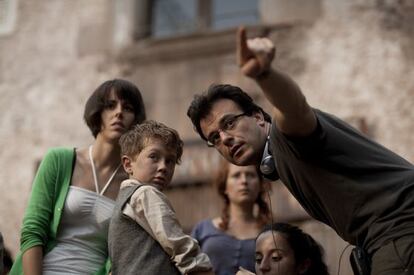The Civil War without the hurt
Juan Carlos Medina’s ‘Painless’ is one of the Spanish films of the year


Beneath the scars that have only superficially covered up the wounds left by the Spanish Civil War, many stories are hidden — enough to spawn important films such as The Spirit of the Beehive and Pan’s Labyrinth. The debut of writer-director Juan Carlos Medina, Painless (known as Insensiblesin Spanish) dares to follow that path, mixing genres to deliver a dark investigation into evil.
“I like films that work on many levels, that switch tones,” Medina explains. The son of a Spanish father and a French mother, he lived in Madrid until the age of 12 before moving to Paris, where he studied film. “But I have never stopped coming back and forth. I did work experience on the set of Torrente,” he remembers.
Getting his debut movie on to the big screen has been a mammoth journey. Medina first wrote the film in 2004 in collaboration with writer and director Luiso Berdejo. “In 2005 the script won a screenplay competition, and we thought that would launch it.” But it didn’t work out like that.
The script won a competition in 2005, and we thought that would launch it”
Medina struggled for years to raise the funding. “Everybody liked it, but nobody got involved. In the US there’s a saying that if you throw a good script out a car window, you’ll watch the film two years later. In Europe they only read the scripts that their buddies bring them.”
Finally, after a lot of effort, “and with backing from France,” he was able to raise a budget of close to three million euros for the movie.
Painless tells two parallel stories: that of a neurosurgeon (Àlex Brendemühl) who discovers his past was not as his parents had told him, and that of a group of children in the 1930s, who are afflicted by a syndrome that leaves them unable to feel pain.
The dramatic lives of the children — led by the cleverest of the bunch, Benigno — in an asylum during the Civil War; the brutal appearance of Berkano, a monstrous torturer; the discoveries made by the neurosurgeon; its relation to historical memory... everything comes together in a horror and fantasy film that avoids the supernatural. “I was looking for resonances between the stories, that the hidden past stops the main character from being a complete person,” he says.
The film concerns a group of children in the 1930s who are unable to feel pain
Medina draws a parallel with what is happening in society today: the past, which often prevents us from seeing, overshadows the present. “For half a century they wanted to uncivilize us. Imagine Spain as a person, with the intellectual rigor of the Second Republic. They cut off his arms and legs and then they ask him to regenerate itself.”
The film, which is released in Spain on Friday, was born out of the character of Berkano: “I asked myself, how can we live without pain? Because man is what he is because he feels. I thought about following the path of his lack of feeling, from childhood and innocence, to his conversion into a monster.”
Medina has directed one of the great Spanish films of the year and is already preparing his next project, Dan Leno and the Limehouse Golem, based on the novel by Peter Ackroyd and adapted by Kick-Ass screenwriter Jane Goldman — “the Rolls-Royce of British screenwriters,” is how he describes her. To be shot in English, the film is a murder mystery set in seedy Victorian London. “It has been an incredible collaboration and now, with the script finished off, we hope to film it at the start of 2014.” With luck, it won’t be such an arduous process as Painless: “Well, all films are difficult,” he says.
Tu suscripción se está usando en otro dispositivo
¿Quieres añadir otro usuario a tu suscripción?
Si continúas leyendo en este dispositivo, no se podrá leer en el otro.
FlechaTu suscripción se está usando en otro dispositivo y solo puedes acceder a EL PAÍS desde un dispositivo a la vez.
Si quieres compartir tu cuenta, cambia tu suscripción a la modalidad Premium, así podrás añadir otro usuario. Cada uno accederá con su propia cuenta de email, lo que os permitirá personalizar vuestra experiencia en EL PAÍS.
¿Tienes una suscripción de empresa? Accede aquí para contratar más cuentas.
En el caso de no saber quién está usando tu cuenta, te recomendamos cambiar tu contraseña aquí.
Si decides continuar compartiendo tu cuenta, este mensaje se mostrará en tu dispositivo y en el de la otra persona que está usando tu cuenta de forma indefinida, afectando a tu experiencia de lectura. Puedes consultar aquí los términos y condiciones de la suscripción digital.








































